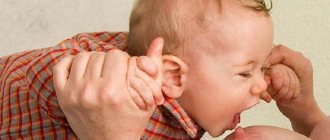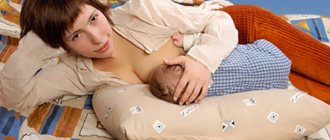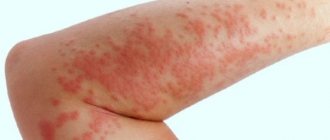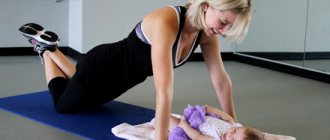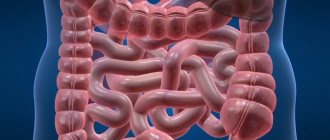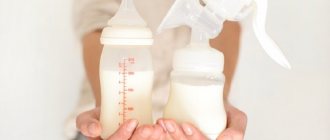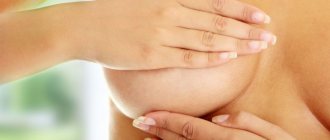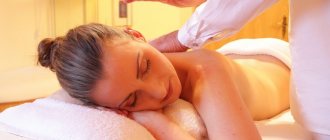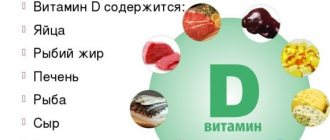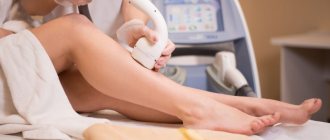A young mother just returned home from the maternity hospital with her baby. A newborn sleeps and eats most of the time, but there comes a time when for the first time something becomes unclear. One of these mysteries for inexperienced parents is hiccups in newborns after feeding. What to do in such cases, since the baby is not an adult, and the folk method of “scaring” is unlikely to be applied to him? This is where the search for an answer to the question begins.
Hiccups are a natural reaction of the body to the environment or its own condition. When this symptom first appears, it often frightens parents, since it is difficult to immediately determine its cause. However, with an adequate and calm approach, it is possible to minimize the consequences of the negative impact of hiccups on the health of the baby.
Nature and mechanisms of occurrence
Hiccups are the result of a reflex contraction of the diaphragm. Anatomically, the diaphragm is an organ completely lined with muscle tissue and delimiting the peritoneum with the organs of the chest.
In a calm state, the diaphragm has a dome-shaped shape, and at the moment of sharp contraction it takes on a flat appearance. During contractions, the volume of the lungs increases slightly as you inhale, creating a characteristic sound.
There are two main causes of hiccups in babies:
- large volume of milk per feeding;
- swallowing excess air.
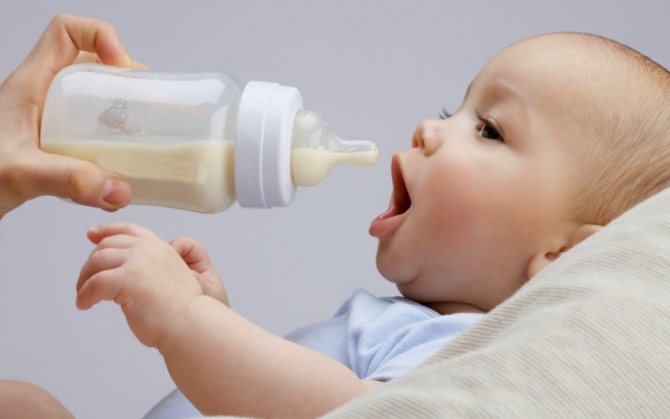
In the first case, the walls of the stomach stretch, having an additional irritating effect on the diaphragm.
Excess swallowed air can be due to a number of reasons:
- long interval between feedings;
- chaotic feeding of the child;
- violation of breastfeeding technique;
- incorrect choice of nipple for the bottle (too intense or weak flow, anatomical discrepancy).
Indirectly, the occurrence of hiccups after feeding is influenced by stress factors, hypothermia, and severe thirst (especially in the case of artificial ones).
Creating comfortable conditions for living, sleeping, feeding and waking often completely eliminates attacks of hiccups in newborns, contributing to the normal development of the digestive system.
What are hiccups in a baby?
Hiccups are a specific process that accompanies breathing and is characterized by involuntary spasmodic contractions of the diaphragm. With hiccups, a narrowing of the airway lumen occurs. It is divided into the following types:
- Physiological. May last from a few seconds to several minutes. It usually begins suddenly without obvious preconditions and goes away on its own without affecting the baby’s condition or causing unpleasant consequences.
- Pathological. Prolonged and frequent hiccups, lasting up to several weeks. Usually accompanied by additional symptoms: headaches, general deterioration, nausea and vomiting. Such hiccups need to be dealt with as early as possible, since they threaten the general condition of the baby.
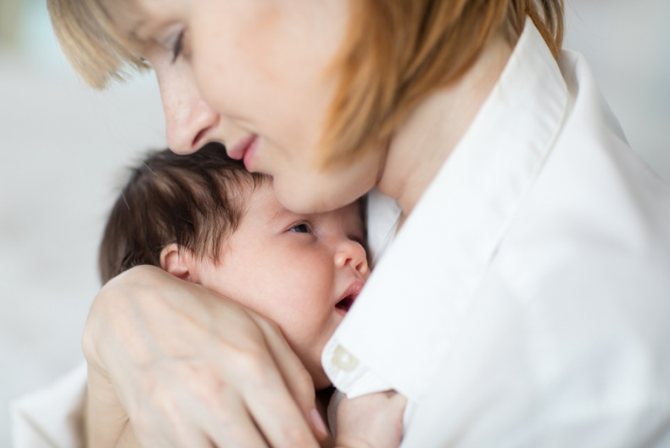
If hiccups in an infant occur quickly and go away over a period of time, this is considered normal and does not require any treatment. But with continuous hiccups, accompanied by additional symptoms, it is necessary to take action.
Features of eliminating hiccups
Hiccups in newborns after feeding - what to do? Normally, hiccups do not cause any particular discomfort to a newborn baby. Contraction of the diaphragm can only intensify the symptoms of colic and existing chronic diseases of the gastrointestinal tract (with a complicated medical history).
Parents are able to independently rid their child of hiccups by following some recommendations from doctors that correspond to the type of feeding and the nature of the causes of their occurrence.
Features when breastfeeding
The amount of milk a nursing mother has is always individual. In the first week after the baby is born, milk increases with particular intensity. It is during this period that it is necessary to learn the technique of breastfeeding, the main points when pumping and the rules for holding the baby while feeding.
Liquid milk usually flows out under high pressure . Hind milk is thick, which ensures that the baby is fully saturated. The problem will be solved by preliminary pumping to provide the baby with quick access to a more nutritious composition.
When feeding, it is better to hold the baby at a higher angle and press the tummy a little harder to the chest.
It is also necessary to monitor the circumference of the baby's chest. The baby should cover the entire areola, not just the nipple. This will reduce or completely eliminate excessive swallowing of air and prevent unpleasant colic, bloating, and hiccups.
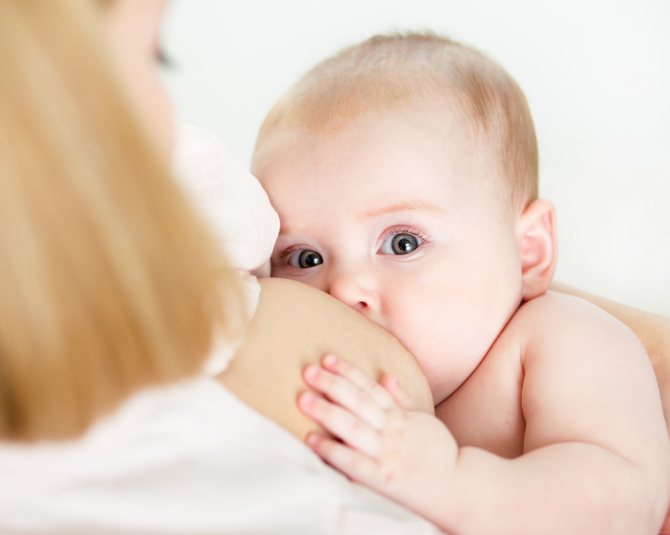
Artificial feeding
The main advantage of artificial feeding with adapted formulas is the ability to accurately determine the amount of nutrition per feeding and select a nipple with the correct flow rate.
There are many more disadvantages when feeding with formulas, the most important of which is the difficulty of selecting the correct composition. Sometimes parents select the ideal mixture only when the baby is ready for a complete change in diet.
To prevent hiccups in children when feeding formula, the following measures should be taken:
- eating small portions, but more often (preventing stomach distension);
- selection of the correct pacifier according to age and anatomy;
- interrupting feeding for massage and carrying in a column (this way you can prevent regurgitation);
- drink water 30-40 minutes after eating.
It is better to buy a bottle nipple with a special valve that prevents the swallowing of excess air. Feeding should be unhurried and occur in a comfortable emotional environment.
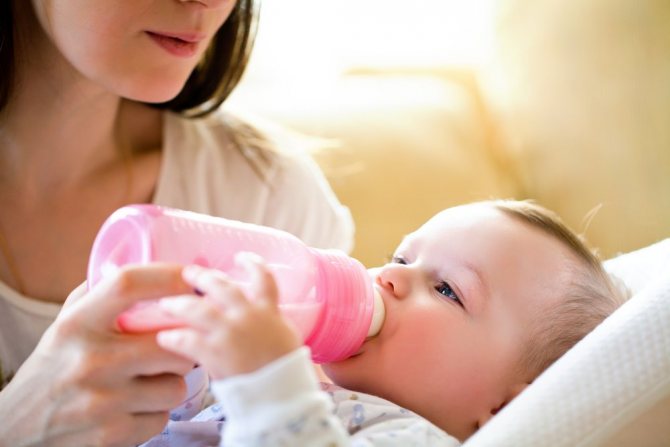
The choice of mixture should be agreed with pediatricians. Thus, retail chains and pharmacies offer a wide range of different formulas for feeding children of different ages, so it is very difficult for parents to immediately navigate the appropriate product.
Experiments with the selection of a formula and its frequent change have a negative impact on the child’s gastrointestinal tract, contribute to stool disorders, digestive disorders, and the development of dysbacteriosis.
While changing clothes after or before feeding, the baby also begins to hiccup from the cold. You should warm him up by wearing warm socks and a suit. The room where the baby eats and sleeps should be warm, cozy, light and clean.
What causes small children to hiccup?
The child begins to hiccup while still in the mother’s womb - this is how his body reacts to external or internal stimuli. The process of hiccups occurs due to rapid contractions of the diaphragm, a muscle that divides the human torso into the thoracic and abdominal sections. Spasms can occur for the following reasons:
- Binge eating. Mothers who feed their children on a schedule run the risk of getting hiccups, since a hungry newborn baby will begin to greedily suck milk after a break in feeding. A fast pace of eating will inevitably lead to air intake and overeating. Due to greedy feeding, the baby will become short of breath, and as a result, hiccups will occur.
- Immaturity of digestion, which is why the baby hiccups after each feeding. It is easy to identify by its characteristic symptoms: gas, colic and loose stools.
- Incorrect attachment of the baby or incorrect feeding of the artificial baby. Because of this, he will swallow air, hiccup and suffer from colic.
- Freezing is one of the reasons why newborns hiccup. The child’s body reacts to sudden changes in temperature in the most accessible way - hiccups.
- Too many external influences - hiccups are a response to stress.
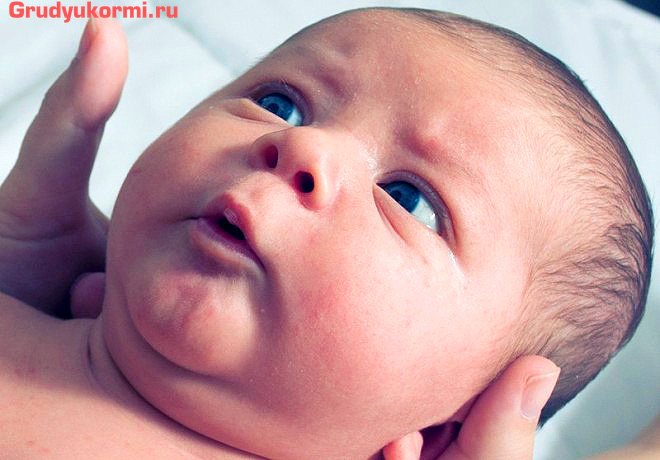
These factors provoke a situation where a newborn hiccups after feeding. But the process of hiccups can also mean more serious problems:
- pneumonia;
- spinal cord pathology;
- digestive system disease;
- the presence of worms;
- development of an aneurysm in the diaphragm.
But such diseases manifest themselves as obsessive hiccups, which constantly bother the baby and prevent him from sleeping, eating and even breathing normally. If this type of hiccup is noted, it is important to go to your pediatrician for diagnosis.
But often the answer to why an infant hiccups after feeding is much simpler: poor nutrition, stress, fear or an uncomfortable environment.
“Moms and dads worry more about hiccups than their newborns. In trying to recognize various pathologies, they may forget that the child may just be thirsty!” — Shkolyar I.S., local pediatrician.
Of course, precautions never hurt. If someone from your environment has recently visited exotic places or feels unwell, then it is better for him not to communicate with children for some time.
Muscle hypertonicity and hiccups
Hiccups in a child also occur against the background of physiological hypertonicity. All muscle structures of the body in newborns are under tension, and children react to additional stimuli with even greater tension. Due to a sharp, intense increase in muscle contractions, the diaphragm spasms, causing hiccups.
Hiccups often cause noise from running household appliances, or neighbors talking through the wall. By creating favorable psycho-emotional conditions, the child’s nervous system will strengthen much faster.
The main prevention against colic and hiccups is the appearance of belching after eating. You can achieve burping by placing the baby on your shoulder with his tummy after feeding. Excess gas bubbles will soon come out, and the baby will become much calmer.
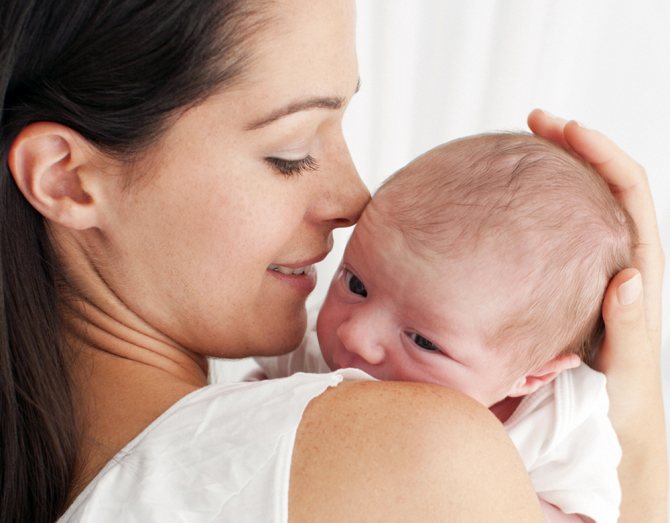
What is the danger
Often a baby hiccups after breastfeeding . The disease may go away on its own after some time. But if this does not happen, then we can talk about the presence of some health problems in the newborn .
Prolonged hiccups can occur due to the following pathologies:
- fetal hypoxia;
- diseases of the digestive tract;
- pathologies of the cardiovascular system;
- nervous tension;
- hypothermia;
- respiratory system disease.
Traditional methods against hiccups
Clinicians identify the following effective methods against hiccups in newborns after feeding:
- tighter pressing to the chest;
- 2-5 drops of chamomile decoction or lemon juice diluted with water 1:5 will help get rid of hiccups;
- dill water (infusion of fennel or dill seed);
- applying a warm diaper to the sternum area;
- It is necessary to create comfortable warmth at home so that the child does not become hypothermic.
In 90% of all cases, hiccups in children do not have a pathological origin, so they go away on their own over time. Parents should protect their child from exposure to various negative factors, and hiccups will stop bothering you over time.
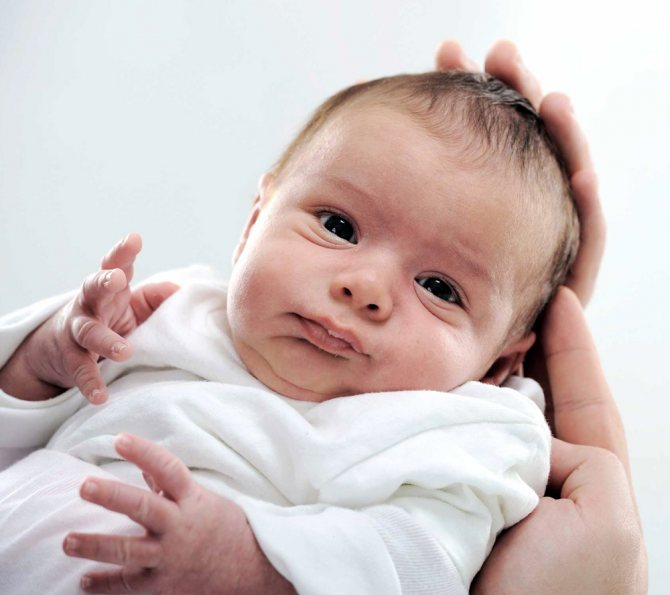
How to help your baby
If after feeding the child begins to hiccup, first of all, you need to try to pick him up in an upright position. This will allow him to burp and release excess air and excess food from his stomach. In addition, in the mother's arms the baby quickly relaxes and warms up, which also helps to cope with hiccups.
To relieve your baby from hiccups, you need to do the following:
- Hold it vertically to eliminate excess air.
- Warm the baby, place a warm diaper on his tummy.
- Perform a gentle massage in the collarbone area.
- Drink boiled or dill water.
If your baby is bottle-fed and hiccups frequently, you need to check that the formula you are using is suitable for him and does not cause colic. If there is bloating that causes hiccups, you can give the baby anti-gas medications (Espumizan and others). A special abdominal massage also helps to cope with colic.
Inadmissible events
Some methods of traditional therapy known to grandmothers are not applicable to a baby when hiccups appear.
The following actions are unacceptable:
- deliberately frightening a child;
- lubricating the tip of the tongue with mustard, salt, vinegar essence;
- drug treatment without consultation with a doctor;
- sudden upward thrust.
All these activities can lead to unforeseen consequences for the child’s body and nervous system. When using medications, it is important to strictly follow the indicated dosage and dosage regimen.
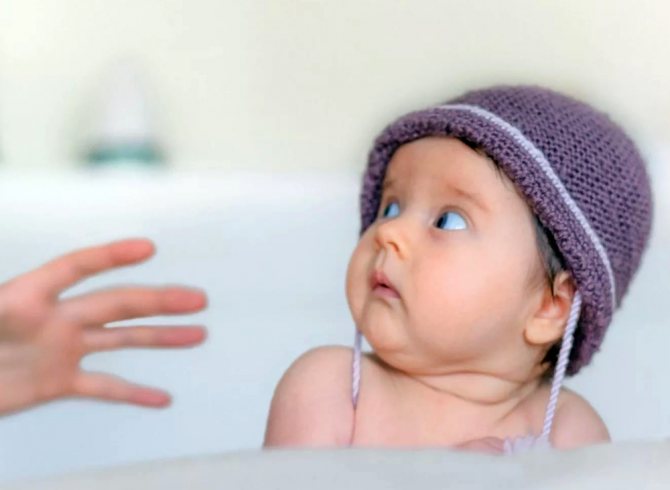
Is it worth worrying about this?
In most cases, hiccups are safe for the baby and are not associated with serious disorders in the body. If it goes away quickly and the baby does not experience severe discomfort, you can do without medical help. But frequent and prolonged hiccups in some cases are a symptom of serious diseases and are not dependent on feeding. This symptom may indicate the following pathologies:
- damage to the central nervous system, spinal cord or brain;
- encephalitis, meningitis;
- intoxication;
- congenital pathologies of the gastrointestinal tract, diaphragm, pleura, aneurysm and lungs;
- injuries;
- tumors;
- parasites and infections in the intestines.
If hiccupping attacks occur constantly in a child, causing disturbances in feeding, sleep and breathing, you need to show him to a specialist as soon as possible. Frequent, severe regurgitation after feeding, which is accompanied by long-term contraction of the diaphragm, is also a reason to undergo examination. Such symptoms may indicate diseases of the spinal cord, lungs, and digestive system.
What not to do if you have hiccups
There are a number of anti-hiccup remedies suitable for adults, but strictly prohibited for children. If your baby hiccups, you should not use the following methods:
- You should not try to scare your baby so that he stops hiccupping. Loud noise can seriously damage a baby's sensitive hearing organs.
- Sour hiccup lozenges can be used by adults but are not suitable for children. Even if the child is over a year old, you should not give him acidic foods, as his digestive system may not be able to handle them.
- It is forbidden to slap a child on the back. His ligaments and bones are still quite soft, and excessive force can seriously injure them. You can tap lightly on the back, but extreme caution is important.
